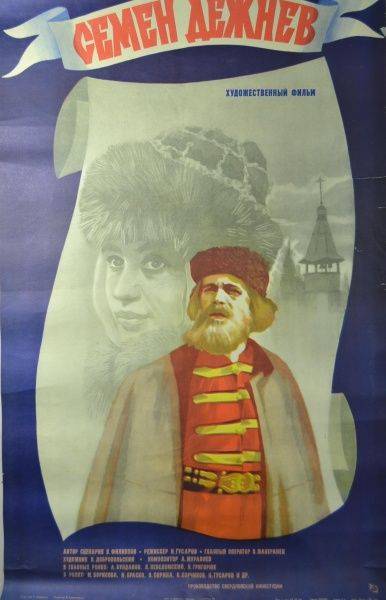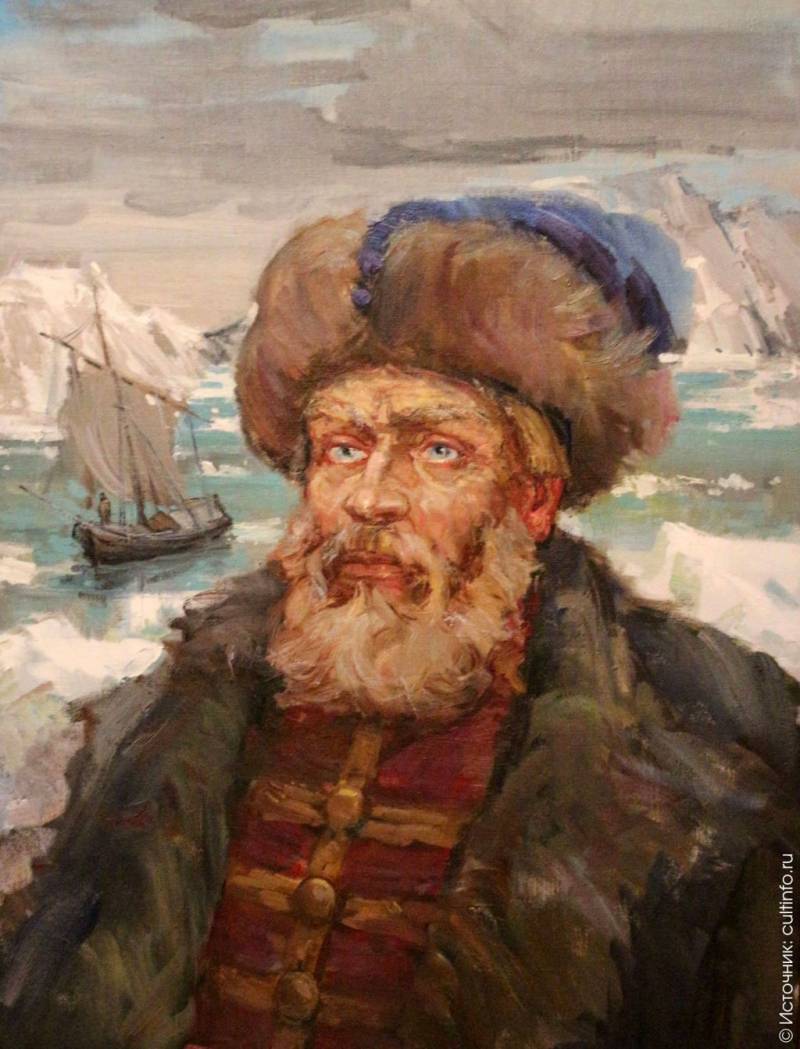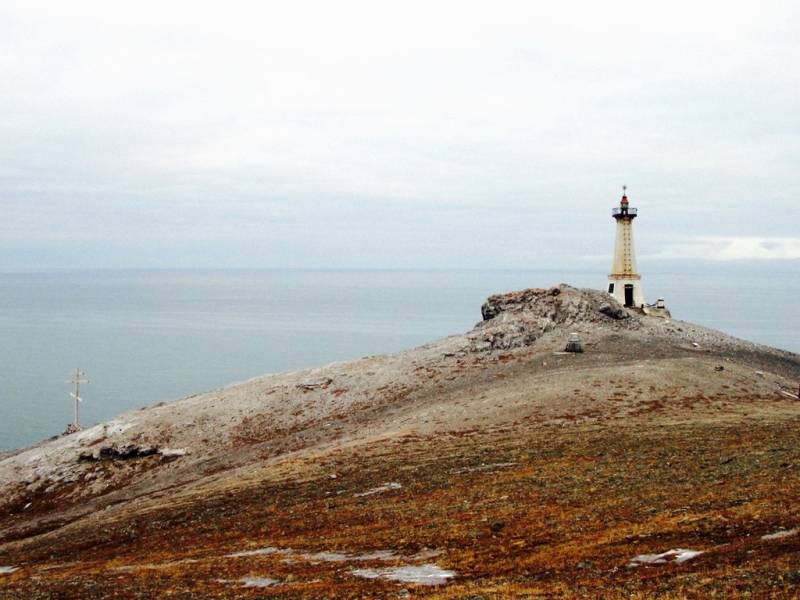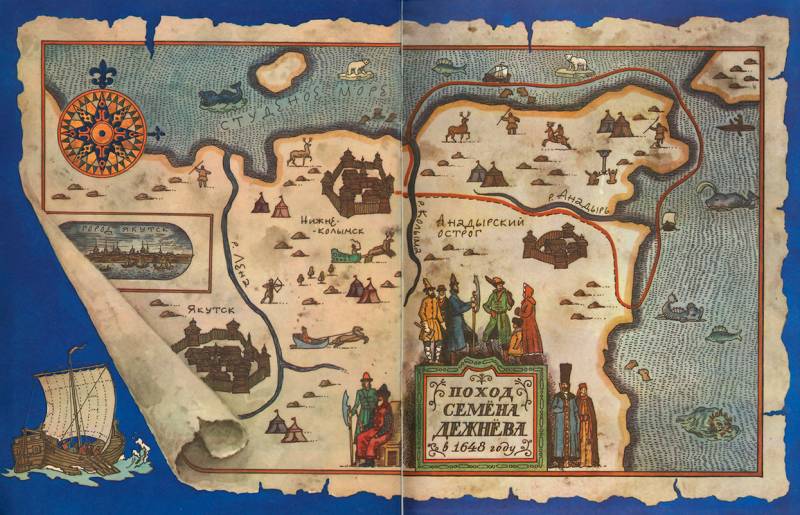Semyon Dezhnev: from Yakutsk and Kolyma to Anadyr and the Bering Strait
Gone for a year, never returned and after twenty
Dezhnev was born in 1605, in Pinega, a hundred and fifty kilometers from Arkhangelsk. The time and place were excellent - many explorers of Siberia just came out of the inhabitants of the northern part of the country.
Like many resolute and willing to get rich countrymen, Semyon moved to the east. Dezhnev was well aware of the hunt, and at first he was engaged not in long-distance hikes, but in fishing in relatively developed places. Yes, so famously, that at the end of 1630-s, it obtained the skins of valuable fur-bearing animals by the hundreds. Not only personally, of course, but also by organizing the processes - purchasing and logistics, as well as paying duties.
In 1638, our hero moved to Yakutsk prison. There he became engaged to a local blood woman who gave birth to a son. In the next few years, Dezhnev, at the head of a detachment in a dozen-another, regularly went on hikes behind the Yasaka Cathedral (fur tax) from local tribes.
The enterprise was always potentially dangerous, as the natives could always try to kill the collectors in order not to pay. But Dezhnev's calm, prudent temper kept him out of trouble - when it helped the cause, he even patiently reconciled the warring Yakut clans.
In 1641, Dezhnev once again left the Yakut fort for the next tribute gathering - in order to return the maximum next year. But the subsequent chain of events postponed these plans for almost two decades - Dezhnev subsequently appeared in the Yakutsk prison only rarely, and did not stay there for a long time.
Kolyma
It all started when Mikhail Stadukhin arrived in Yakutsk - another bright personality in the history of the Siberian frontier. Stadukhin outfitted an expedition of several dozen people - Cossacks and Allied Yakuts. Among them was Dezhnev.
Things did not go very well - the detachment was ambushed by the natives, who killed the horses. Then Stadukhin decided to build a Kochi (small sailing-rowing ships), and the Cossacks began to walk along the local rivers in search of untidy natives. And in 1643, Stadukhin discovered Kolyma. Having founded several jails on it, he went to Yakutsk, where he told everyone about the new river (the same traffic artery!) And places rich in sable. And also about not given (for now) under the arm of Moscow tribes.
Through the Strait of the Unborn Bering
But Dezhnev remained in Kolyma, engaged in fishing and the war with aggressive natives, who were struggling to knock the Russians from their land. In 1648, he joined a merchant expedition named Fedot Popov. 7 Kochi participated in the case - they went to the Arctic Ocean and turned east.
But everything went awry - the sea was very stormy, and the Kochi fought one after another. The expedition went through the Bering Strait, although even more 30 years remained until the day of the birth of Vitus Bering himself.
The fact is that in the 17th century, while Siberia was infested with sables, it represented great opportunities for personal enrichment, and everyone was interested in fur skins, and not geographical discoveries in themselves. And the strait itself was perceived in the applied sense, as an object of transport infrastructure, and not as a means of gaining fame. Therefore, information on the existence of the strait did not go further than Yakutsk. And as a result, in the XVIII century, the geographical object was named Bering - he quite sincerely did not know that there were other documented discoverers.
True, our hero still got his share of geographic names - after his death, the cape, the extreme eastern point of Chukotka, was named after Dezhnev.
Troubles
Some time after the passage of the Bering Strait, Koch Dezhnev also washed ashore. Our hero showed himself from the best side - gathered all the survivors, the surviving supplies, and, not really knowing where he was, went on foot. Until he reached the river Anadyr. Reaching this river, he, in the best traditions of the conquerors of Siberia, set up a jail.
In 1650, a squad of Seeds Motors approached Dezhnev, looking for the same kind as any Russian group in Siberia - fur. It should be noted, not without incident.
Motor managed to meet with Mikhail Stadukhin - the same man who organized the 1641 expedition of the year, “pulling” Dezhnev from Yakutsk. Stadukhin was a brave and selfless explorer, but he had a violent temper. And he hated Motor, which was, incidentally, mutual.
Both of these detachments were looking for a land route to Anadyr. Stadukhin was not going to endure competitors, and attacked the Motors squad. The latter was captured and put in pads. Stadukhin for some time knocked out of Motors a written commitment to turn back, after which the Seeds were released. Motor, however, did not intend to adhere to the word thus obtained. Moving far enough away from Stadukhin, he turned back to Anadyr, and eventually connected with the much more adequate Dezhnev, after which he prepared for the worst.
But, apparently, the increase in the strength of the enemy, and, possibly, the position of Stadukhin Dezhnev, already familiar to him, kept Mikhail from aggressive actions. Although the atmosphere in the prison was still tense. But in the end the problem was solved by itself. Dissatisfied with the scarcity of sables around, Stadukhin turned south.
Эльдорадо
And absolutely nothing. Dezhnev with Motor, quite satisfied with the surrounding lands, took up the usual thing - the fishing and subordination of the surrounding tribes. The last lesson became fatal for Motors - in the spring of 1652, he died in a battle with the Yukagirs.
But the remaining chief Dezhnev soon hit the jackpot - having reached the mouth of Anadyr, he discovered a huge number of walruses. Their tusks were valued not less than sable - but it was much easier to get sluggish walruses. These happy people Dezhnev and took up.
In Anadyr prison, there were tons of walrus bone, but it was unclear how to ship it to the “mainland”. To go back through the Bering Strait after the shipwreck experienced in 1648 did not draw, and the land route was filled with evil natives. Small parties could easily slip through, but a full-fledged caravan would be likely to be crushed along the way.
In 1654, Dezhnev decided to give it a try, and sent a small amount of walrus bone to Yakutsk - just a pood. At the same time, his envoys carried a petition. In it, Semyon asked for protection for a large convoy, his salary for the past ten years, and also a clerk in the Anadyr fortress for his replacement.

The process was somewhat delayed - the following year, merchant Yury Seliverstov, a friend of Stadukhin, was granted a jail to Dezhnev. Remembering the conflict of his friend with the already dead Motor, he tried to “drive” on Dezhnev, accusing him of self-designation of the Anadyr fortress. The attempt was unsuccessful - the people of Dezhnev were loved by their balanced commander, and Seliverstov did not indulge in provocations. Then he, pissed, left and began writing denunciations of the Anadyrians.
Triumph
After long correspondence with his superiors, Dezhnev managed to clear his name, and in 1659, a new salesman was sent to the Anadyr burg. Dezhnev himself was allowed to personally deliver the walrus bone he collected directly to Moscow.
He managed to do this by the fall of 1664. Bringing four and a half tons of fangs to the capital, he sold them for 17 thousand rubles - crazy money for those times. The walruses were, of course, not his, but the state, but Dezhnev was not relied on such a small share - 500 rubles. How much is this can be judged from the ratio of this amount to the salary for almost 20 years (from 1641 year) paid to Dezhnev in the same place - 126 rubles.
Rich and elevated to the rank of Cossack ataman, Dezhnev continued to serve in Siberia, including the convoying of large batches of sables from Yakutsk to Moscow. During one of these enterprises, in 1673, he died in the capital.



Information